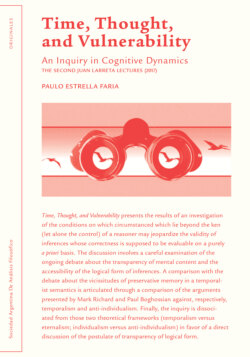Читать книгу Time, Thought, and Vulnerability - Paulo Estrella Faria - Страница 5
На сайте Литреса книга снята с продажи.
Foreword
ОглавлениеHonoured by the Argentine Society for Philosophical Analysis (SADAF) with the invitation to deliver the 2017 Juan Larreta Lectures, I took the occasion to probe into a set of interrelated problems belonging to what David Kaplan termed ‘cognitive dynamics’—a field of philosophical inquiry which deals with the conditions on which propositional contents are retained, reiterated, redeployed, modified, lost and (sometimes) retrieved. My overall aim was to try and bring together two strands in my recent work which had until then followed parallel paths in a seemingly Euclidean space, all but avoiding one another. These are the philosophy of time (concentrating on the temporalism vs. eternalism debate, hence on the very notion of a temporal proposition: a proposition whose truth-value changes with time), and the epistemology of reasoning (concentrating on the individualism vs. anti-individualism debate, hence on the very notion of a world-involving thought, specifically as that impinges upon what Paul Boghossian calls ‘the apriority of our logical abilities’). That’s why I called the first two lectures, respectively, ‘Transience’ and ‘Preservation’. In these two lectures I claim, in particular, that Mark Richard’s 1981 argument from belief retention against temporalism and Paul Boghossian’s 1989 argument from preservative memory against anti-individualism share a common structure and a crucial pair of analogous premises; that they invite analogous responses (which have actually been put forward); and that such responses fall short of fully taking the sting off the original arguments, given precisely the way they are interrelated. Put it as follows. Suppose temporalism is true; then we have a problem (Richard’s problem) about content preservation. Suppose anti-individualism is true; then we have a problem (Boghossian’s problem) about content preservation. Since I hold that both problems are real and stand unsolved (for good reason: they are, or so I will argue, strictly unsolvable), my defence of both temporalism and anti-individualism eventuates in an investigation of the varieties of conceptual (and other) losses which are the lot of creatures whose cognitive lives are such that both temporalism and anti-individualism are true of them—hence the title of the third and last lecture.
I am grateful to the audiences at SADAF for the lively discussions. Running the risk of forgetting someone (for which I apologise in advance), I single out Alberto Moretti, Diana Pérez, Eduardo Barrio, Eleonora Orlando, Federico Penelas and Sandra Lazzer, whose contributions were warmly appreciated. I hope the result does not disappoint them.
Porto Alegre, May 2018
